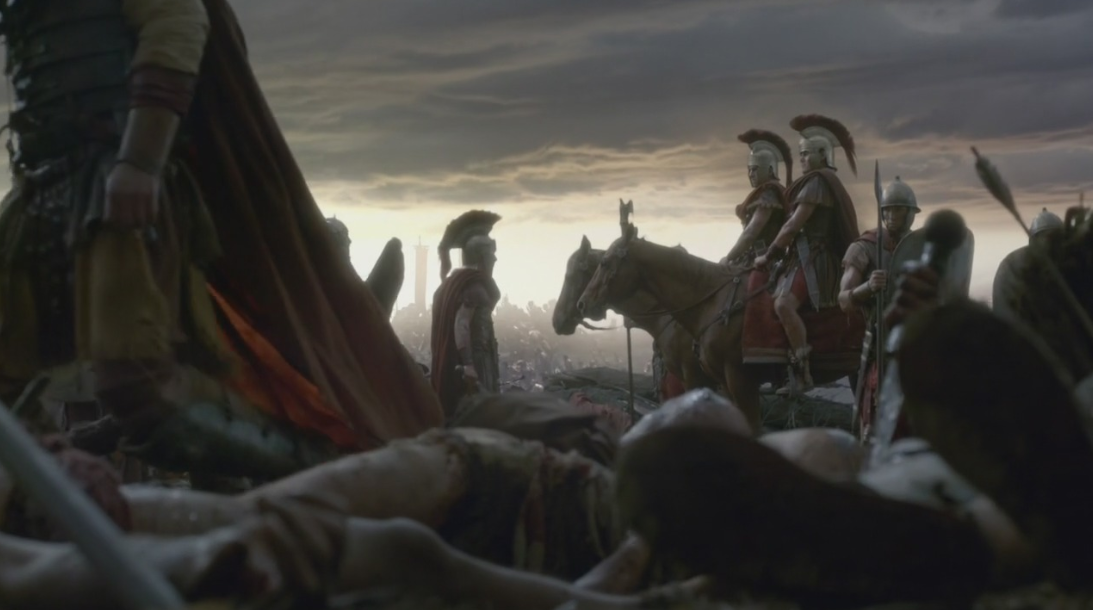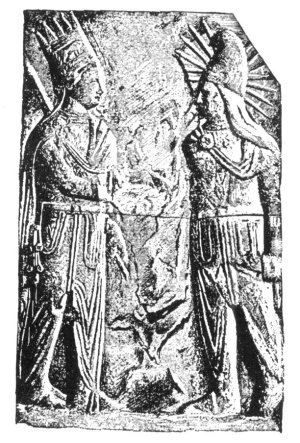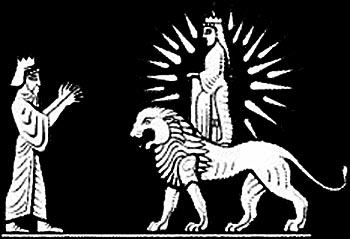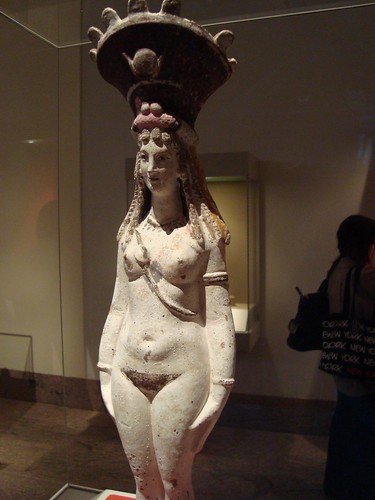Chapter XC: On Reform And Realignments
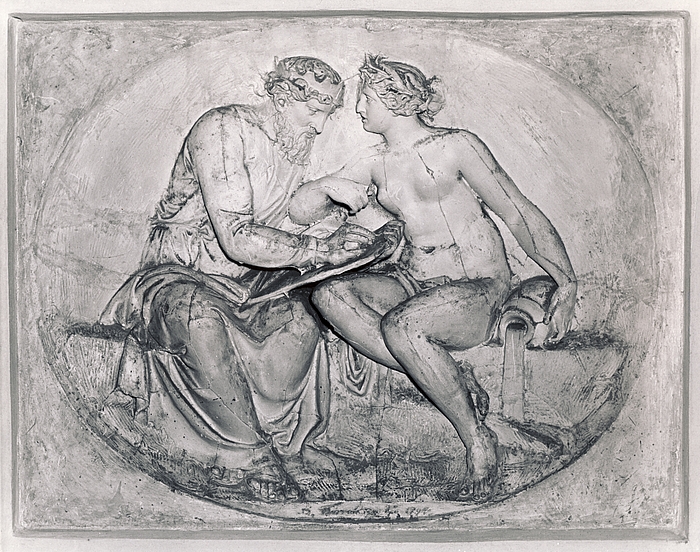

As the new year began, the Emperor Caesarion found himself beset with bad news and problems on all sides. From Germania came news of the death of his step-brother Iullus; from Arabia the death of his young son Aphroditos. The threat of civil war lingered in the client kingdoms of Mauretania and Cyrene. In the East his foul brother Alexander Helios had reunited Media and Parthia and in Judaea the rapidly failing health of King Herod stood to deprive that unruly people of their first truly competent ruler in generations. In Arabia the tribes had rallied to expel the Romans and their Nabataean allies from the south of the peninsula. The legions that might have been sent to deal with them were employed elsewhere, more specifically in Egypt, clearing the canals of Nile of years of accumulated silt. Also in Egypt the attempts of the dioketes Apphius to reclaim alienated royal rents and monopolies had disturbed a population long accustomed to lenient rule; there were outbreaks of violence against Romans and Greeks[1]. In Rome the unpopularity of some of Caesarion's recent legislative measures sparked fears of revolution which the blatancy of his autocratic rule did little to abate.
It was the Emperor's wife, the lady Livia Drusilla, who rose to the occasion as her husband fell into melancholic stupor and wine-fueled complacency. Behind the scenes she steered events and commandeered the body of Senators who advised Caesarion on state matters. On her advice he refused a number of honors voted him by the Senate at the start of the year and formally relinquished to their control the provinces of Alpes Maritimae, Alpes Cottiae, Alpes Poeninae, Gallia Narbonensis, newly created Dalmatia (the seaboard of Illyricum) and Achaea. Urged by his wife he recommended to the plebs a bill proposed by Aelius Marrulinus, cancelling altogether the extremely unpopular collection of tithes, cancelled in the Asiatic provinces by the Divine Julius long ago but still collected elsewhere. A second Lex Aelia exempted senators, patricians and plebeians from tiresome jury duty - henceforth the sole prerogative of equestrians.
Heeding complaints from the knights he agreed to revise the recent legislation they deemed offensive. He passed the Lex Julia de adulteriis coercendis, a bill delineating sexual offences punishable by law, which clarified and abrogated some of the punishments set out in the Lex Julia de maritandis ordinibus of the previous year. Concubinage was fully enfranchised and the children of a concubine could be legitimized through a testatio. Illicit relations (stuprum) between a man and a woman were henceforth only liable to prosecution where a third party was involved - a spouse (in which case it constituted adultery), a father or tutor. Thus a freeborn woman might happily serve a man as his mistress[2]; and if the man was freeborn and unmarried, then a marriage tie was presumed by law. High born women were prohibited from defaming themselves by registering as prostitutes or performing on the stage[3]. Of the list of kin considered sacrilegious (incestum) to marry, nieces of both kinds were removed for the first time[4]. Finally the power of family courts to persecute and punish adultery and fornication were limited in various ways.

The ongoing war in Germania and the threat of war and revolt elsewhere necessitated a swift restructuring of the Republic's armies. Some 10,000 soldiers were dispatched to Tiberius and Drusus, to settle and man fortifications being built along and beyond the Rhine. The legions II Sabina and the X Gemina were recalled from Hispania, by now pacified enough to warrant the attention and upkeep of a single legion. The two legions then in Egypt were also relocated: the II Cyrenaica relocated to Petra and the XII Deiotariana to Cyrene. The legion-sized Ravennan fleet (Classis Ravennas) was dislocated to Alexandria, to take over the cleaning and repair of Egypt's canals from the legions, to guard and supervise the recently finished Fossa Regis (the reopened canal connecting the Nile delta to the Red Sea) and to ward off piracy in the Red Sea. The Misenum fleet (Classis Misenensis) in turn assumed the Ravennas' prior responsibility for policing the Adriatic. The majority of legions were thus amassed against the Germans in the west and against the Parthians and Arabs in the east; the rest of the Empire was manned by comparatively negligible troops (often numbering only a few hundred) in the command of local governors.
With Tiberius and Drusus commanding the bulk of his legions and the Senate in command of a greater number of provinces, Caesarion moved to secure himself as the ultimate commander and benefactor of the legions. He recommended to the Senate the creation of the aerarium militare, a special treasury to provide payment for veteran pensions, thus ensuring their ultimate loyalty and service to the State (and Caesarion) and not their immediate commanders. To this treasury Caesarion allocated 80 million sesterces of his own funds and the incomes from death duties, sales tax and hundredths levied on auctions and slave sales. In recognition the Senate passed a resolution obligating each legion to employ in its first cohort an officer called imaginifer, to carry the Emperor's image into battle.
Even now the Emperor found detractors in many corners, even among the lower classes. Twice rabble rousers attempt to inflame the people against the Emperor as he passed through the streets; a plot to poison him involving several of his freedmen was also uncovered. In a bid for popularity, Caesarion drew from his own pockets to finance the Roman State's own subsidization of grain to 350,000 of its poorest citizens; recent upheavals in Egypt and silted canals had inflated prices of late. Attempts by worried magistrates to cut down the number of those benefiting from the grain dole (the highest number in Rome's history) were blocked by the Emperor, who agreed to further subsidize the dole (at great personal expense) for the next two years.
Caesarion next ordered plans for the completion of buildings and renovations necessary for the celebration of the long-overdue Ludi Saeculares (Secular Games). After all, he had yet to honor Rome with games on the level of those he had presided over in the East. The oft-delayed Games would mark the start of a new cycle of games, proudly proclaiming the start of a new era - an era which began with Caesarion's restoration of the Republic and the abolition of the illegal ordinances of the triumviral period[5]. On the Emperor's recommendations work was slow - both to ensure proper infrastructure, and to allow for the return of a victorious Tiberius and Drusus. It was hoped the brothers would return triumphant with many thousands of blue-eyed barbarians fit for unprecedented slaughter and spectacle.
These moves were all highly popular and helped allay Republican sentiment in Rome and revolutionary sentiment abroad.
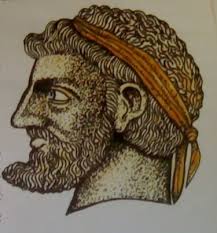
Under Imperial direction the African legion, the Legio II Augusta, moved from Carthage into Numidia and Mauretania and seized control. The ever steadfast King Juba II was freed and restored to the throne, but applied for permission to retire to Rome. Caesarion acquiesced and installed him in grand style in the Domus Augusti. Juba was given authority to execute or otherwise punish his son Pompeius - he chose to exile him to Rhegium on the Italian mainland. The latter's wife Cleopatra of Cyrene was given leave to accompany him, but chose to follow her father-in-law to the luxury of Rome.
Arriving at the same time was Caesarion's son Isidorus Caesar, now a young man of eighteen. Showing himself a loyal and obedient son, he married without protest his father's choice Aemilia Paulla, treating her with noted circumspection and dignity. For his timely intervention, Fortunatus was honored with an equus publico and entry into the equestrian order.
Fortunatus brought with him unfortunate news from the East, where unrest was spreading like wildfire. The Arabs had united under a sheikh Goiasos, disrupting Roman-Nabataean trade in both the Persian Gulf and Red Sea; the Nabataeans murmured under the rule of a child-king, desiring greatly a strong warrior capable of protecting their interests and waging war on their behalf. Queen Cleopatra had accompanied the Legio II Cyrenaica to Petra, where she made use of her relationship with Caesarion to maintain order and assume government in her grandson's name. The death, some said assassination, of Attambalos II of Characene had deprived Rome of an important ally (lackey) in the Gulf. In Armenia the people cried out against the cruelty of their young king, Tigranes IV. In Babylon the young King Philip had been smuggled away to Arbela, chief city of Roman Assyria and home of the King of Adiabene. Most of the Romans in Babylon had followed suit. The affairs of Philip's capital were now in the hands of the savage Galatian brigands recently deported there - it was said their leaders Luterix and Combolomarix shared for wife Agathokleia[6], hitherto the intended bride of Philip. Further north in the Caucasus the Alans moved in worrying numbers, raiding in Colchis and Iberia. Behind every turn and twist Fortunatus feared the hand of an Alexander Helios eager to regain Mesopotamia, his Empire's most significant possession. Caesarion and the Senate were inclined to agree and eager to take precautions.
With the support of the plebs and Senate, Caesarion resolved to dispatch Isidorus back to the East. He was to tour the provinces, impose order, assess and check the Parthian threat. As proconsular legate he was to have command of the Eastern legions. An expert body of advisors, generals and politicians were appointed to accompany and assist him in carrying out the mandate given him. With the insignia of a praetor, Fortunatus was to continue in command the Antiochenes, henceforth Isidorus' private bodyguard. The physicians and botanists Antonius Musa and Euphorbus, the studious geographer and historian King Juba and Faustus Sulla, with his experience of the East, joined him as Isidorus' chief companions. Additionally Furius Camillus, friend of Tiberius, was named president of the Council of Asia; the hardened generals Sulpicius Quirinius and Cornelius Balbus received in turn Assyria and Syria. All three and several eastern kings were charged by the Emperor to assist and receive his son.
Caesarion remained in Rome but made plans to tour both Spain and Africa.
It was the Emperor's wife, the lady Livia Drusilla, who rose to the occasion as her husband fell into melancholic stupor and wine-fueled complacency. Behind the scenes she steered events and commandeered the body of Senators who advised Caesarion on state matters. On her advice he refused a number of honors voted him by the Senate at the start of the year and formally relinquished to their control the provinces of Alpes Maritimae, Alpes Cottiae, Alpes Poeninae, Gallia Narbonensis, newly created Dalmatia (the seaboard of Illyricum) and Achaea. Urged by his wife he recommended to the plebs a bill proposed by Aelius Marrulinus, cancelling altogether the extremely unpopular collection of tithes, cancelled in the Asiatic provinces by the Divine Julius long ago but still collected elsewhere. A second Lex Aelia exempted senators, patricians and plebeians from tiresome jury duty - henceforth the sole prerogative of equestrians.
Heeding complaints from the knights he agreed to revise the recent legislation they deemed offensive. He passed the Lex Julia de adulteriis coercendis, a bill delineating sexual offences punishable by law, which clarified and abrogated some of the punishments set out in the Lex Julia de maritandis ordinibus of the previous year. Concubinage was fully enfranchised and the children of a concubine could be legitimized through a testatio. Illicit relations (stuprum) between a man and a woman were henceforth only liable to prosecution where a third party was involved - a spouse (in which case it constituted adultery), a father or tutor. Thus a freeborn woman might happily serve a man as his mistress[2]; and if the man was freeborn and unmarried, then a marriage tie was presumed by law. High born women were prohibited from defaming themselves by registering as prostitutes or performing on the stage[3]. Of the list of kin considered sacrilegious (incestum) to marry, nieces of both kinds were removed for the first time[4]. Finally the power of family courts to persecute and punish adultery and fornication were limited in various ways.

The ongoing war in Germania and the threat of war and revolt elsewhere necessitated a swift restructuring of the Republic's armies. Some 10,000 soldiers were dispatched to Tiberius and Drusus, to settle and man fortifications being built along and beyond the Rhine. The legions II Sabina and the X Gemina were recalled from Hispania, by now pacified enough to warrant the attention and upkeep of a single legion. The two legions then in Egypt were also relocated: the II Cyrenaica relocated to Petra and the XII Deiotariana to Cyrene. The legion-sized Ravennan fleet (Classis Ravennas) was dislocated to Alexandria, to take over the cleaning and repair of Egypt's canals from the legions, to guard and supervise the recently finished Fossa Regis (the reopened canal connecting the Nile delta to the Red Sea) and to ward off piracy in the Red Sea. The Misenum fleet (Classis Misenensis) in turn assumed the Ravennas' prior responsibility for policing the Adriatic. The majority of legions were thus amassed against the Germans in the west and against the Parthians and Arabs in the east; the rest of the Empire was manned by comparatively negligible troops (often numbering only a few hundred) in the command of local governors.
With Tiberius and Drusus commanding the bulk of his legions and the Senate in command of a greater number of provinces, Caesarion moved to secure himself as the ultimate commander and benefactor of the legions. He recommended to the Senate the creation of the aerarium militare, a special treasury to provide payment for veteran pensions, thus ensuring their ultimate loyalty and service to the State (and Caesarion) and not their immediate commanders. To this treasury Caesarion allocated 80 million sesterces of his own funds and the incomes from death duties, sales tax and hundredths levied on auctions and slave sales. In recognition the Senate passed a resolution obligating each legion to employ in its first cohort an officer called imaginifer, to carry the Emperor's image into battle.
Even now the Emperor found detractors in many corners, even among the lower classes. Twice rabble rousers attempt to inflame the people against the Emperor as he passed through the streets; a plot to poison him involving several of his freedmen was also uncovered. In a bid for popularity, Caesarion drew from his own pockets to finance the Roman State's own subsidization of grain to 350,000 of its poorest citizens; recent upheavals in Egypt and silted canals had inflated prices of late. Attempts by worried magistrates to cut down the number of those benefiting from the grain dole (the highest number in Rome's history) were blocked by the Emperor, who agreed to further subsidize the dole (at great personal expense) for the next two years.
Caesarion next ordered plans for the completion of buildings and renovations necessary for the celebration of the long-overdue Ludi Saeculares (Secular Games). After all, he had yet to honor Rome with games on the level of those he had presided over in the East. The oft-delayed Games would mark the start of a new cycle of games, proudly proclaiming the start of a new era - an era which began with Caesarion's restoration of the Republic and the abolition of the illegal ordinances of the triumviral period[5]. On the Emperor's recommendations work was slow - both to ensure proper infrastructure, and to allow for the return of a victorious Tiberius and Drusus. It was hoped the brothers would return triumphant with many thousands of blue-eyed barbarians fit for unprecedented slaughter and spectacle.
These moves were all highly popular and helped allay Republican sentiment in Rome and revolutionary sentiment abroad.
Under Imperial direction the African legion, the Legio II Augusta, moved from Carthage into Numidia and Mauretania and seized control. The ever steadfast King Juba II was freed and restored to the throne, but applied for permission to retire to Rome. Caesarion acquiesced and installed him in grand style in the Domus Augusti. Juba was given authority to execute or otherwise punish his son Pompeius - he chose to exile him to Rhegium on the Italian mainland. The latter's wife Cleopatra of Cyrene was given leave to accompany him, but chose to follow her father-in-law to the luxury of Rome.
Arriving at the same time was Caesarion's son Isidorus Caesar, now a young man of eighteen. Showing himself a loyal and obedient son, he married without protest his father's choice Aemilia Paulla, treating her with noted circumspection and dignity. For his timely intervention, Fortunatus was honored with an equus publico and entry into the equestrian order.
Fortunatus brought with him unfortunate news from the East, where unrest was spreading like wildfire. The Arabs had united under a sheikh Goiasos, disrupting Roman-Nabataean trade in both the Persian Gulf and Red Sea; the Nabataeans murmured under the rule of a child-king, desiring greatly a strong warrior capable of protecting their interests and waging war on their behalf. Queen Cleopatra had accompanied the Legio II Cyrenaica to Petra, where she made use of her relationship with Caesarion to maintain order and assume government in her grandson's name. The death, some said assassination, of Attambalos II of Characene had deprived Rome of an important ally (lackey) in the Gulf. In Armenia the people cried out against the cruelty of their young king, Tigranes IV. In Babylon the young King Philip had been smuggled away to Arbela, chief city of Roman Assyria and home of the King of Adiabene. Most of the Romans in Babylon had followed suit. The affairs of Philip's capital were now in the hands of the savage Galatian brigands recently deported there - it was said their leaders Luterix and Combolomarix shared for wife Agathokleia[6], hitherto the intended bride of Philip. Further north in the Caucasus the Alans moved in worrying numbers, raiding in Colchis and Iberia. Behind every turn and twist Fortunatus feared the hand of an Alexander Helios eager to regain Mesopotamia, his Empire's most significant possession. Caesarion and the Senate were inclined to agree and eager to take precautions.
With the support of the plebs and Senate, Caesarion resolved to dispatch Isidorus back to the East. He was to tour the provinces, impose order, assess and check the Parthian threat. As proconsular legate he was to have command of the Eastern legions. An expert body of advisors, generals and politicians were appointed to accompany and assist him in carrying out the mandate given him. With the insignia of a praetor, Fortunatus was to continue in command the Antiochenes, henceforth Isidorus' private bodyguard. The physicians and botanists Antonius Musa and Euphorbus, the studious geographer and historian King Juba and Faustus Sulla, with his experience of the East, joined him as Isidorus' chief companions. Additionally Furius Camillus, friend of Tiberius, was named president of the Council of Asia; the hardened generals Sulpicius Quirinius and Cornelius Balbus received in turn Assyria and Syria. All three and several eastern kings were charged by the Emperor to assist and receive his son.
Caesarion remained in Rome but made plans to tour both Spain and Africa.
Notes:
[1] Roman citizens and citizens of the three Greek cities of Egypt were exempt from poll-tax levied on all adult Egyptian males, among various other privileges and superior status.
[2] OTL Augustus' intervention in the intimate love lives of his citizens generated significant resistance, not least from highborn women who did not appreciate the restrictions and penalties imposed upon them. Many took to registering as prostitutes in order to keep their lovers without fear of exile, confiscation, etc.
[3] OTL a measure of Tiberius following the evasion methods mentioned in [2].
[4] OTL uncle-niece marriage was only legalized under Claudius, who wished to marry his niece Agrippina. Marrying a maternal niece was still illegal, and uncle-niece marriage was made illegal again in the Christian era. Caesarion would have been motivated by the planned marriage of his grandchildren Tiberillus and Agrippina, legally uncle-niece thanks to the adoption of Agrippina's father.
[5] OTL Augustus did something similar - clearly differentiating between his own "Republican" "constitutional" era and the illegitimate, unconstitutional upheaval of the triumviral period. Here the reigns of Octavian/Antony and Vipsanian are swept under the rug, Caesarion's reign legally falling in place right after his own father's.
[6] Daughter of Alexander Helios, now restored as King of Kings in Parthia and Media. A worrisome alliance if there ever was one.
